International trust laws govern the process of setting up a means of protecting your assets across international borders.
As an American citizen, you can set up an international trust to control your assets beyond the jurisdiction of U.S. civil creditors. U.S. judges cannot gain access to your assets because of how international trust laws are written. Through said laws, the trustees for your assets are foreign citizens.
Learning more about the origins of the International Trusts Act can help you leverage its stipulations more efficiently.
What Is the International Trusts Act?
The International Trusts Act creates the legal parameters for establishing offshore trusts to protect their assets. The act, passed in 1984, focused on trusts in the Cook Islands. Since its enactment, other global trust acts have appeared in several other locations worldwide.
The Cook Islands International Trusts Act has undergone multiple changes and amendments over the ensuing four decades. However, the basic idea of creating and upholding laws to protect assets in offshore holdings remains in place.
Because of the way the act is written, any civil judgment against you in the United States cannot access these assets, assuming you have transferred them offshore in advance under the proper conditions.
Legal Significance of International Trust Laws
In basic terms, international trust laws deal with assets that have legal ramifications in two different countries. For more complex cases, the trust could involve more than two countries. The most common options related to trust legislation abroad include the following:
- A resident of one country creates a trust governed by the laws of another country
- The trust fits under the governance of one country yet holds property in another country
- The trustee lives in one country, but the trust itself fits under the laws of another country
The Pre-1984 Trust Landscape
Before the creation of the International Trusts Act in 1984, international trusts were rare. Among the conditions leading to the first international trust law litigation was the increased movement of people and assets across country borders. As these shifts became more frequent, the need for legal oversight became increasingly clear.
The result of all this was the International Trusts Act of 1984, which set the precedent for the future. While the act’s parameters might seem strict on paper, they exist to protect the offshore holder’s assets as much as possible and, as proven by the amendments discussed below, to mitigate any fraud risks.
Amendments and Highlights
Early on, the International Trusts Act underwent multiple amendments. Although recent years have seen fewer amendments, trust laws in different countries continue to change and adapt to the times.
1985 Amendment
The 1985 amendment to the Cook Islands International Trusts Act added a clearer definition of what constitutes an international trust. It also spelled out more explicit residency guidelines for settlors and beneficiaries.
1989 Amendments
The act underwent two different amendments in 1989. These clarified the governance and creation of trusts and allowed the introduction of special trusts.
In September of that year, the first amendment reworked the definition of the disposition of property in the trust. It added more detailed descriptions for the forms of transfer and disposition, including sale, lease, gift, and other options.
For those entering into a contract related to the disposition of property in an international trust, this amendment included provisions for the relevant contracts.
Additionally, the amendment included definitions for the rights and claims of heirs to the assets held in the trust. The rights in the amendment included circumstances beyond the claims of interest found in a will.
The second amendment in December 1989 dealt with the right to derive income from property inside the trust. It also discussed the ability to dispose of property in the trust, whether the property in question was in the Cook Islands or elsewhere.
1991 Amendment
The 1991 amendment to the International Trusts Act also addressed the disposition of property found in the trust, further defining the 1989 amendment and adding transparency to the operation of the trusts.
When the disposition of property occurs from a location other than the Cook Islands and is sent to another international trust, the disposition must occur according to the laws governing that trust. As long as the disposition is valid under the International Trusts Act, the laws of the new trust’s jurisdiction apply to other factors of the disposition.
The amendment further defined community property held under the international trust. It treated the disposition of community property in the same way as the disposition of other types of property going into a new international trust in a different jurisdiction.
1995-1996 Amendment
The 1995-1996 amendment cleaned up quite a bit of language from the original act and previous amendments. The amendment focused on preventing fraudulent activities in the trust.
First and foremost, it defined the trust’s protector as someone who can appoint or remove trustees. Thus, the protector was shown to hold veto power.
The amendment also established the validity of the trust instrument as long as the trust was executed by the settlor, trustee, and other parties at a place within the Cook Islands.
Finally, the amendment allowed trustees to create a name for the trust, making it easier to identify. The name of the trust could be part of an affidavit specifying the actions the trustees could take on behalf of the trust. The affidavit also established any limitations on trustees.
1999 Amendment
The 1999 amendment to the act addressed several different topics, including the following:
- Determining the scope of assets available to include in the trust, leading to greater diversification in assets.
- Defining what types of damages against a trust are considered punitive damages. The creditor has the burden of proof to establish that the damages are not punitive.
- Defining the custodian trustees, giving them full powers of delegation.
- Allowing assets to be held in the name of the managing trustee to facilitate management of the assets.
- Enhancing the definition of the trust protector as laid out in the 1995-1996 amendment. The protector could now be a settlor, trustee, or beneficiary of the trust.
- Ensuring the amendment applies to the international trusts registered before or after the amendment.
The 1999 amendment also defined the maintenance of the records of the trust. Said records may be kept in written, electronic, or other forms of data storage as long as they remain accessible.
After the termination of an international trust or a trustee’s resignation, the amendment specifies that the trustee must maintain the records for at least three years. Following the three years, the trustee can destroy the records if desired.
2004 Amendment
The 2004 amendment to the act focused on strengthening the rights of beneficiaries. It also sets the time required for renewing the certification of registration.
It included provisions for enhanced privacy, prohibiting anyone from disclosing any information related to the international trust, including its establishment and business affairs. A few exceptions to this rule on privacy were also included in the amendment, including:
- When the court orders such disclosure
- When the person making the disclosure must do so to perform a function under the International Trusts Act
- When the disclosure must occur to comply with the provisions of a search warrant
The privacy portion of the amendment requires any judicial proceedings related to the trust, other than criminal proceedings, to occur on camera. However, the court is given the ability to remove the camera from the proceedings.
Finally, the 2004 amendment changed the 1999 amendment by requiring that the trustees of the international trust hold on to the records for at least six years instead of three.
2013 Amendment
The 2013 amendment to the International Trusts Act aligned the trust laws with modern financial practices. This amendment enhanced the ability of trusts to remain financially competitive worldwide.
This amendment required that the trustee maintain current and accurate records of the international trust. Information to be included in that record was as follows:
- Types of income the trust is holding, including cash or in-kind
- All assets the trust holds
- Any assets available for the beneficiary of the trust to use
- Any distributions the trust makes
Additionally, the amendment required the international trust to be prepared to establish and report its financial position at any time. The amendment did not require precision; it only required that the financial position be “reasonably accurate.”
2014 Amendment
The 2014 amendment to the International Trusts Act refined the previous language related to land tenure, inheritance, and legal proceedings.
Fees and Costs
Fees and costs for international trusts vary quite a bit depending on multiple factors, including the following:
- The jurisdiction in which you are setting up the trust
- The cost of hiring professionals in that jurisdiction to manage the trust
- Management fees from your legal team
- Whether you want an international trust protector to manage the assets
The cost of setting up an international trust typically runs between $10,000 and $50,000. You then have management fees on top of the initial setup cost. Weighing the benefits against the costs will ultimately determine the viability of this decision, and an experienced international trust firm can help guide you through the process.
If you want to pay less in setup fees, you may have access to fewer features and protections. For example, you may be unable to hire a trust protector if you are trying to save money. Trying to save costs may limit where you can create international trusts.
At Blake Harris Law, we help clients reduce the costs of setting up an international trust. For example, we often negotiate lower prices with the offshore trust providers we work with regularly.
How Are International Trusts Important Today?
International trust laws continue to be important. Offshore trust regulations provide a higher level of privacy for asset holders, which is crucial in an ever-expanding digital world.
Many jurisdictions offering trust statutes worldwide also have limited or no income tax requirements on capital gains. By taking advantage of these international trust laws, you could potentially save quite a bit in income taxes owed. However, you may still need to report the income in your home country depending on your citizenship status.
Ultimately, the most important aspect of an international trust continues to be protecting your assets from civil proceedings and collections. Legal proceedings that originate in the United States have little recourse for seizing assets in your international trust because of the way foreign laws are written.
When you are ready to discuss how you might want to take advantage of the International Trusts Act, we are ready to help. Contact Blake Harris Law today to discuss your situation.







